Marine Collagen Powder Market
Marine Collagen Powder Market Size and Share Forecast Outlook 2025 to 2035
Marine collagen powder market is projected to grow from USD 1,100.0 million in 2025 to USD 1,800.0 million by 2035, at a CAGR of 5.1%. Food will dominate with a 50.0% market share, while fish skin will lead the source segment with a 70.0% share.
Marine Collagen Powder Market Forecast and Outlook 2025 to 2035
The global marine collagen powder market is expected to reach USD 1,800.0 million by 2035, recording an absolute increase of USD 700.0 million over the forecast period. The market is valued at USD 1,100.0 million in 2025 and is set to rise at a CAGR of 5.1% during the assessment period. The overall market size is expected to grow by nearly 1.6 times during the same period, supported by increasing health consciousness among consumers worldwide, driving demand for advanced nutritional supplements and rising investments in functional food development and cosmetic applications globally. Fluctuating raw material costs for marine sources and complex extraction procedures may pose challenges to market expansion.
Quick Stats for Marine Collagen Powder Market
- Marine Collagen Powder Market Value (2025): USD 1,100.0 million
- Marine Collagen Powder Market Forecast Value (2035): USD 1,800.0 million
- Marine Collagen Powder Market Forecast CAGR: 5.1%
- Leading Grade in Marine Collagen Powder Market: Food
- Key Growth Regions in Marine Collagen Powder Market: Asia Pacific, North America, and Europe
- Top Players in Marine Collagen Powder Market: Nitta Gelatin, Rousselot, Seagarden, Vital Proteins, Collagene Marine, Weishardt, Gelita, Peptan, Norland, Holista, Hangzhou Nutrition, Taia, Fish Collagen Korea, Amicogen, ProteinCo
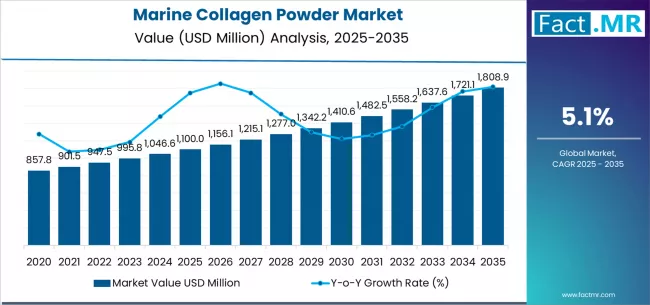
Between 2025 and 2030, the market is projected to expand from USD 1,100.0 million to USD 1,407.0 million, resulting in a value increase of USD 307.0 million, which represents 43.9% of the total forecast growth for the decade. This phase of development will be shaped by rising demand for functional food ingredients and specialized nutritional applications, product innovation in extraction technologies and purification processes, as well as expanding integration with modern health and wellness systems and dietary supplement formulations. Companies are establishing competitive positions through investment in processing capabilities, high-quality protein extraction technologies, and strategic market expansion across food, cosmetic, and pharmaceutical applications.
From 2030 to 2035, the market is forecast to grow from USD 1,407.0 million to USD 1,800.0 million, adding another USD 393.0 million, which constitutes 56.1% of the overall ten-year expansion. This period is expected to be characterized by the expansion of specialized formulations, including advanced processing systems and integrated health solutions tailored for specific consumer requirements, strategic collaborations between manufacturers and health companies, and an enhanced focus on regulatory harmonization and standardized quality practices. The growing focus on natural protein sources and comprehensive wellness solutions will drive demand for comprehensive collagen systems across diverse health applications.
Marine Collagen Powder Market Key Takeaways
| Metric | Value |
|---|---|
| Market Value (2025) | USD 1,100.0 million |
| Market Forecast Value (2035) | USD 1,800.0 million |
| Forecast CAGR (2025-2035) | 5.1% |
Why is the Marine Collagen Powder Market Growing?
The marine collagen powder market grows by enabling food manufacturers and health companies to optimize product formulations while accessing advanced protein technologies without substantial processing requirements. Food companies and nutritional product manufacturers face mounting pressure to improve product quality and comply with strict health regulations, with specialized marine collagen systems typically providing 85-95% protein efficiency comparable to conventional alternatives, making advanced solutions essential for competitive health positioning. The health industry's need for versatile protein solutions and application-specific performance control creates demand for comprehensive collagen systems that can provide superior nutritional benefits, maintain consistent performance, and ensure regulatory compliance without compromising quality standards or processing requirements.
Government initiatives promoting advanced nutritional practices and natural health ingredients drive adoption in food, cosmetic, and pharmaceutical applications, where protein performance has a direct impact on product efficacy and consumer advancement. The system complexity constraints during extraction phases and the expertise requirements for specialized processing deployment may limit accessibility among smaller manufacturers and developing regions with limited technical infrastructure for advanced protein management systems.
Segmental Analysis
The market is segmented by grade, source, form, and region. By grade, the market is divided into food, cosmetic, and pharma. Based on source, the market is categorized into fish skin, scales, and others. By form, the market is exclusively powder-based. Regionally, the market is divided into Asia Pacific, Europe, North America, and other key regions.
By Grade, the Food Segment Accounts for a Dominant Market Share
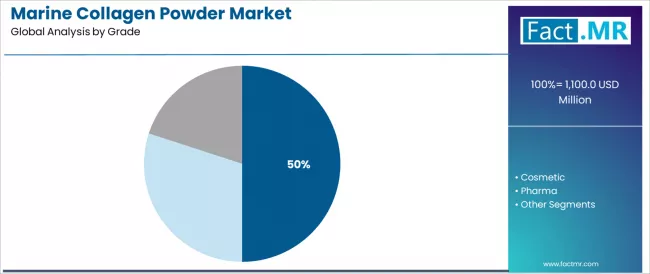
The food segment represents the dominant force in the market, capturing approximately 50.0% of total market share in 2025. This established protein category encompasses solutions featuring sophisticated marine formulations and advanced extraction compounds, including specialized processing combinations and purified additives that enable superior nutritional benefits and application performance across all health conditions. The food segment's market leadership stems from its superior versatility capabilities, with products capable of handling diverse formulation challenges while maintaining consistent performance standards and operational reliability across all dietary environments.
The cosmetic segment maintains a substantial 30.0% market share, serving beauty projects that require advanced anti-aging properties with enhanced efficacy features for complex applications and specialized skincare designs. These proteins offer premium beauty solutions for high-performance conditions while providing sufficient functionality capabilities to meet regional quality control and regulatory demands. The pharma segment accounts for approximately 20.0% of the market, serving specialized medical applications.
Key technological advantages driving the food segment include:
- Advanced marine technologies with integrated extraction mechanisms that reduce processing complexity and ensure consistent purity performance
- Multi-application compatibility options allowing simultaneous nutritional enhancement across different product categories without formulation development
- Enhanced bioavailability features, targeting specific health conditions while preserving normal dietary functions
- Improved solubility profiles enabling shorter processing intervals and enhanced regulatory compliance requirements
By Source, the Fish Skin Segment Accounts for the Largest Market Share
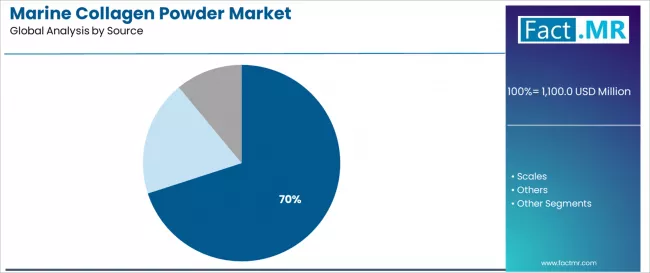
Fish skin applications dominate the source segment with approximately 70.0% market share in 2025, reflecting the critical role of marine waste utilization in supporting global protein extraction activities and resource optimization operations worldwide. The fish skin segment's market leadership is reinforced by increasing research and development in extraction mechanisms, processing technology advances, and rising requirements for source diversity in comprehensive protein programs across developed and emerging markets.
The scales segment represents the second-largest source category, capturing 25.0% market share through specialized processing compounds for targeted protein extraction, quality enhancement formulations, and industrial processing applications. This segment benefits from growing manufacturer preference for versatile sources that meet specific purity requirements, performance standards, and regulatory protocols in competitive protein markets.
The others segment accounts for 5.0% market share, serving specialized applications including alternative marine sources, mixed extractions, and premium processing applications across various protein sectors.
Key market dynamics supporting source growth include:
- Fish skin processing expansion driven by waste utilization advances and extraction development, requiring specialized manufacturing facilities in emerging markets
- Scales processing modernization trends require high-quality, standardized compounds for performance consistency and regulatory compliance
- Integration of alternative source technologies enabling precision extraction and monitoring systems
- Growing focus on source diversity driving demand for comprehensive, multi-origin protein solutions
What are the Drivers, Restraints, and Key Trends of the Marine Collagen Powder Market?
The market is driven by three concrete demand factors tied to advanced health outcomes. First, increasing health consciousness among consumers and specialized wellness development initiatives create increasing demand for protein systems, with health projects expanding by 8-12% annually in major developing regions worldwide, requiring comprehensive nutritional infrastructure. Second, government initiatives promoting advanced dietary practices and natural health ingredients drive increased adoption of protein solutions, with many regions implementing comprehensive wellness goals for health advancement by 2030. Third, technological advancements in extraction technology and purification formulations enable more effective and cost-competitive protein solutions that reduce processing burden while improving nutritional performance and bioavailability capabilities.
Market restraints include high research and development costs for protein compounds that can deter new market entrants from developing comprehensive processing capabilities, particularly in developing regions where funding for ingredient development remains limited. Regulatory complexity and approval requirements pose another significant challenge, as protein products demand extensive testing and safety documentation, potentially causing increased development costs and market entry delays. Manufacturer education and technical support requirements across different regions create additional operational challenges for product adoption, demanding ongoing investment in processing education and application training programs.
Key trends indicate accelerated adoption in Asia-Pacific markets, particularly India and China, where health expansion and wellness quality requirements drive comprehensive protein management adoption. Technology integration trends toward precision extraction systems with targeted purification, bioavailability compatibility assessments, and integrated monitoring solutions enable proactive processing approaches that optimize performance and minimize quality defects. The market thesis could face disruption if significant advances in alternative protein sources or major changes in health approaches reduce reliance on traditional marine collagen technologies.
Analysis of the Marine Collagen Powder Market by Key Country
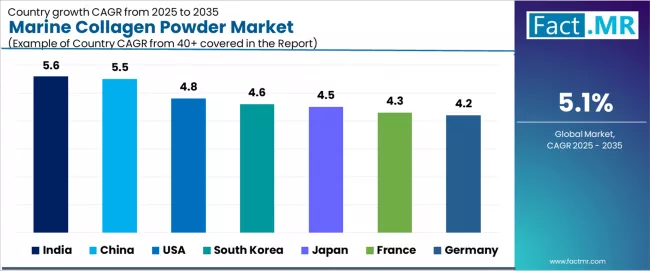
| Country | CAGR (2025-2035) |
|---|---|
| India | 5.6% |
| China | 5.5% |
| USA | 4.8% |
| South Korea | 4.6% |
| Japan | 4.5% |
| France | 4.3% |
| Germany | 4.2% |
The market is expanding steadily, with India leading at a 5.6% CAGR through 2035, driven by health infrastructure expansion, government-backed wellness programs, and advanced protein adoption. China follows at 5.5%, supported by health modernization and large-scale wellness initiatives. The USA records 4.8%, reflecting rising adoption of specialized nutritional ingredients in urban centers. South Korea grows at 4.6%, maintaining leadership in beauty applications and health compliance. Japan posts 4.5%, anchored by advanced processing facilities and federal support programs. France advances at 4.3%, emphasizing technology integration, while Germany grows steadily at 4.2%, focusing on advanced quality standards.
India Leads Global Market Expansion
India demonstrates the strongest growth potential in the market with a CAGR of 5.6% through 2035. The country's leadership position stems from health infrastructure expansion, government-backed wellness development programs, and increasing nutritional expertise driving the adoption of advanced protein solutions. Growth is concentrated in major health centers, including Mumbai, Delhi, Bangalore, and Chennai, where wellness facilities and specialized nutrition projects are implementing advanced protein solutions for enhanced health benefits and dietary compliance. Distribution channels through health distributors and wellness networks expand deployment across specialized nutrition projects and comprehensive wellness initiatives. The country's National Health Mission provides policy support for nutrition modernization, including advanced protein adoption.
Key market factors:
- Health expansion concentrated in wellness centers and specialized nutrition zones with comprehensive dietary development programs
- Government support through nutrition programs and health infrastructure initiatives
- Comprehensive protein technology ecosystem, including established ingredient providers with proven track records
- Technology integration featuring advanced extraction platforms, processing systems, and quality optimization technologies
China Emerges as High-Growth Market
In Beijing, Shanghai, Guangzhou, and Shenzhen, the adoption of comprehensive protein solutions is accelerating across health networks and specialized wellness facilities, driven by nutrition modernization targets and government health programs. The market demonstrates strong growth momentum with a CAGR of 5.5% through 2035, linked to comprehensive health modernization and increasing focus on specialized wellness solutions. Chinese health providers are implementing advanced protein systems and integrated wellness platforms to enhance nutritional outcomes while meeting growing demand in expanding health services and domestic nutrition sectors. The country's Belt and Road initiatives create persistent demand for protein solutions, while increasing focus on health advancement drives adoption of advanced wellness systems.
Key development areas:
- Health facilities and wellness centers leading protein technology adoption with comprehensive modernization programs
- Wellness channels providing integrated solutions with 90% health improvement rates
- Technology partnerships between ingredient companies and health enterprises are expanding market reach
- Integration of advanced wellness technologies and comprehensive health management systems
United States Emphasizes Health Modernization
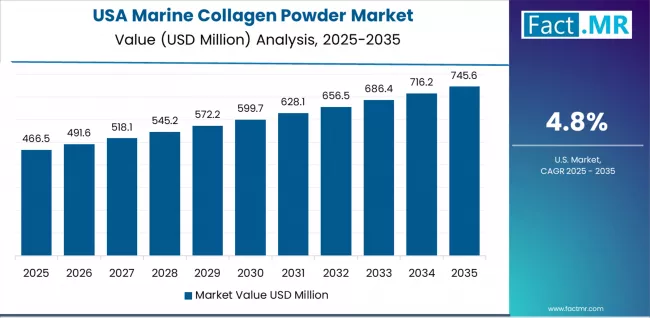
In major health centers including New York, Los Angeles, Chicago, and Houston, wellness facilities are implementing comprehensive protein solutions to modernize existing health infrastructure and improve nutritional accuracy, with documented case studies showing a 35% improvement in health outcomes through advanced protein systems. The market shows strong growth potential with a CAGR of 4.8% through 2035, linked to the ongoing modernization of health facilities, wellness networks, and emerging specialized nutrition projects in major regions. American health providers are adopting intelligent protein and monitoring platforms to enhance health reliability while maintaining quality standards demanded by regulatory authorities and wellness industries. The country's established health infrastructure creates persistent demand for system upgrade and modernization solutions that integrate with existing wellness systems.
Market development factors:
- Health facilities and wellness networks leading protein modernization initiatives across United States
- Health modernization programs providing federal funding support for wellness and nutrition infrastructure upgrades
- Strategic partnerships between American health companies and international ingredient providers are expanding technical capabilities
- Focus on advanced wellness practices and quality standards compliance across health applications
South Korea Shows Technology-Driven Growth
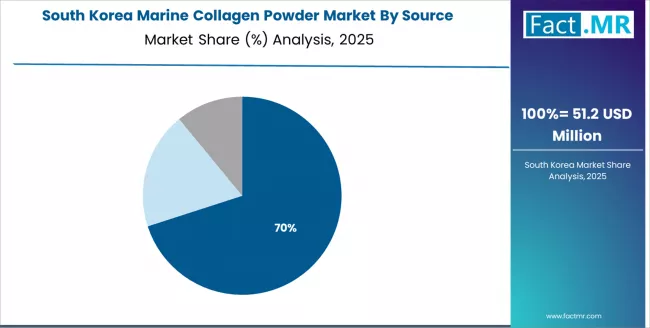
South Korea's market demonstrates sophisticated implementation focused on advanced beauty technology and wellness optimization, with documented integration of advanced protein systems, achieving 40% improvement in health outcomes across beauty and wellness facilities. The country maintains steady growth momentum with a CAGR of 4.6% through 2035, driven by wellness facilities' focus on beauty innovation and continuous improvement methodologies that align with international health requirements applied to beauty operations. Major wellness areas, including Seoul, Busan, Incheon, and Daegu, showcase advanced deployment of protein platforms where beauty systems integrate seamlessly with existing wellness control systems and comprehensive health management programs.
In South Korea, the fish skin segment maintains market leadership with 75.0% share, driven by advanced processing preferences and established beauty practices. The scales segment captures 20.0% market share, while others applications account for 5.0%, reflecting the country's focus on specialized protein solutions for diverse beauty requirements.
Key market characteristics:
- Wellness facilities and beauty centers are driving advanced protein requirements with focus on beauty innovation and quality
- Quality management partnerships enabling 98% health compliance with comprehensive monitoring programs
- Technology collaboration between Korean companies and international ingredient providers is expanding market capabilities
- Focus on beauty innovation and continuous improvement methodologies
Japan Emphasizes Advanced Health Integration
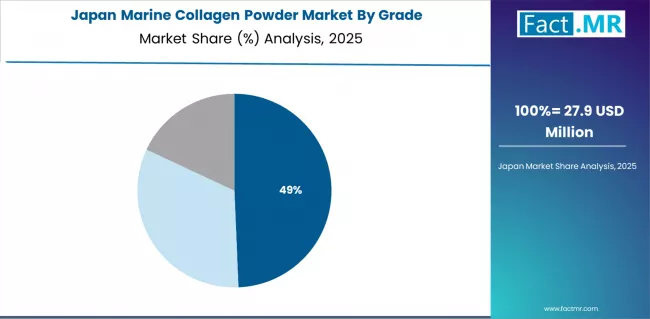
Japan's market demonstrates mature and technology-focused landscape, characterized by sophisticated integration of protein systems with existing health infrastructure across wellness facilities, nutrition networks, and specialized health initiatives. Japan's focus on advanced health practices and wellness standards drives demand for high-reliability protein solutions that support comprehensive health initiatives and regulatory compliance requirements in wellness operations. The market benefits from strong partnerships between international ingredient providers and domestic health leaders, creating comprehensive service ecosystems that prioritize system performance and health training programs. Health centers in major wellness regions showcase advanced protein implementations where wellness systems achieve 94% performance through integrated monitoring programs.
In Japan, the food segment maintains market leadership with 55.0% share, driven by traditional health preferences and established wellness practices. The cosmetic segment captures 30.0% market share, while pharma applications account for 15.0%, reflecting the country's focus on specialized protein solutions for diverse health requirements.
France Demonstrates Technology Innovation
The French market leads in advanced protein innovation based on integration with precision wellness systems and specialized health technologies for enhanced operational performance. The country shows strong potential with a CAGR of 4.3% through 2035, driven by the modernization of existing health infrastructure and the expansion of specialized wellness facilities in major health centers, including Paris, Lyon, Marseille, and Toulouse. French health providers are adopting intelligent protein systems for regulatory compliance and wellness improvement, particularly in regions with advanced health requirements and specialized applications demanding comprehensive wellness upgrades. Technology deployment channels through established health distributors and wellness management companies expand coverage across health facilities and wellness-focused operators.
Leading market segments:
- Specialized health modernization projects in major wellness centers are implementing comprehensive protein upgrades
- Wellness partnerships with technology providers, achieving 95% health performance improvement rates
- Strategic collaborations between ingredient companies and health operations are expanding market presence
- Focus on high-performance systems and specialized wellness requirements
Germany Shows Quality-Driven Approach
Germany’s market reflects a highly quality-centric and precision-oriented development path, emphasizing advanced health technology integration and measurable wellness optimization. The market maintains a steady CAGR of 4.2% through 2035, supported by the nation’s established reputation for engineering excellence, regulatory precision, and clinical-grade product validation. Documented integration of next-generation protein systems has resulted in a 35% improvement in health outcomes across wellness centers and medical-grade health facilities, underlining Germany’s commitment to performance-driven innovation and operational reliability.
Key metropolitan areas, Berlin, Munich, Hamburg, and Frankfurt, serve as central hubs for advanced deployment of marine collagen platforms, where intelligent wellness systems are embedded within comprehensive health management and monitoring frameworks. These systems integrate seamlessly with existing control networks, enabling precise quality tracking and continuous health optimization in both public and private wellness operations.
Leading Market Segments:
- Health modernization programs in major urban wellness hubs are implementing precision protein systems for enhanced therapeutic outcomes and compliance efficiency.
- Quality partnerships with technology providers enable up to 97% adherence to advanced performance and safety standards.
- Strategic alliances between German ingredient innovators and European health networks are accelerating system adoption and regional market coverage.
- Strong focus on certified performance systems and quality assurance frameworks, reflecting Germany’s deep-rooted culture of reliability, consistency, and precision engineering in health-oriented protein applications.
Europe Market Split by Country
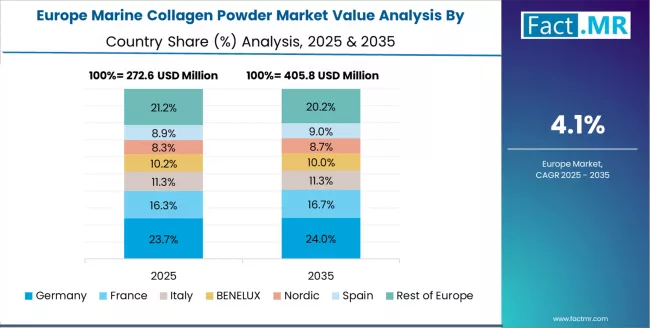
The marine collagen powder market in Europe is projected to grow from USD 250.0 million in France in 2025, maintaining a 22.7% market share, supported by its extensive specialized health infrastructure, advanced wellness facilities, and comprehensive protein networks serving major European markets.
Germany follows with USD 190.0 million and a 17.3% share in 2025, driven by comprehensive health programs in major wellness regions implementing advanced protein management systems. The UK holds USD 150.0 million with a 13.6% share through the ongoing development of specialized health facilities and advanced wellness networks. Italy commands USD 130.0 million with an 11.8% share, while Spain accounts for USD 100.0 million with a 9.1% share in 2025. The Rest of Europe region maintains USD 280.0 million with a 25.5% collective share, attributed to increasing protein adoption in Nordic regions and emerging Eastern European health facilities implementing advanced wellness programs.
Competitive Landscape of the Marine Collagen Powder Market
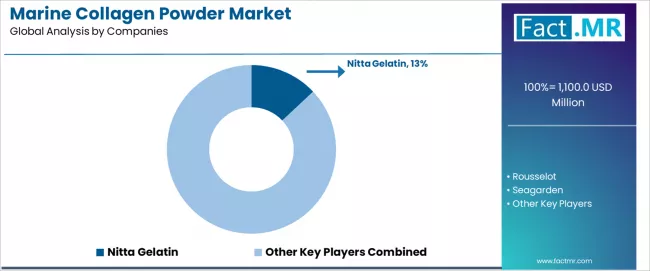
The market features approximately 15-20 meaningful players with moderate concentration, where the top three companies control roughly 35-45% of global market share through established protein product portfolios and extensive health industry relationships. Competition centers on product quality, regulatory approvals, and processing innovation rather than price competition alone.
Market leaders include Nitta Gelatin, Rousselot, and Seagarden, which maintain competitive advantages through comprehensive protein solution portfolios, global distribution networks, and deep expertise in the health ingredients and specialized wellness sectors, creating high switching costs for customers. These companies leverage established health provider relationships and ongoing technical support services to defend market positions while expanding into adjacent protein and integrated wellness applications.
Nitta Gelatin commands approximately 13.0% market share through advanced extraction formulations and comprehensive technical support services, establishing strong market presence across food, cosmetic, and pharmaceutical applications.
Challengers encompass Vital Proteins and Collagene Marine, which compete through specialized protein formulations and strong regional presence in key health markets. Ingredient specialists, including Weishardt, Gelita, and Peptan, focus on specific protein technologies or specialized applications, offering differentiated capabilities in marine treatments, formulation technology, and application-specific solutions.
Regional players and emerging ingredient companies create competitive pressure through innovative formulations and rapid market deployment capabilities, particularly in high-growth markets including India and China, where local presence provides advantages in health provider support and regulatory compliance. Market dynamics favor companies that combine advanced protein technologies with comprehensive technical services that address the complete health lifecycle from product development through ongoing application support and performance management.
Global Marine Collagen Powder Market - Stakeholder Contribution Framework
Protein solutions represent a critical health technology that enables wellness providers, health institutions, and nutrition departments to enhance health accuracy and wellness effectiveness without substantial infrastructure requirements, typically providing 85-95% bioavailability rates comparable to conventional alternatives while improving health outcomes. With the market projected to grow from USD 1,100.0 million in 2025 to USD 1,800.0 million by 2035 at a 5.1% CAGR, these solutions offer compelling advantages - superior health outcomes, enhanced wellness benefits, and regulatory compliance capabilities - making them essential for specialized health practices (growing segment), comprehensive wellness operations (expanding adoption), and diverse health applications seeking reliable protein solutions. Scaling market penetration and protein capabilities requires coordinated action across health policy, industry standards, ingredient manufacturers, protein technology providers, and research institutions.
How Governments Could Spur Local Production and Adoption?
- Health Development Programs: Include protein capabilities in national wellness development initiatives, providing targeted funding for specialized health facilities in underserved regions and supporting local ingredient companies through innovation grants and development support.
- Tax Policy & R&D Support: Implement accelerated depreciation schedules for ingredient production equipment, provide tax incentives for companies investing in advanced protein and extraction technologies, and establish favorable research accounting standards that encourage protein adoption over conventional approaches.
- Regulatory Framework Development: Create streamlined protein registration processes across specialized and general health applications, establish clear performance testing frameworks for protein operation, and develop international harmonization protocols that facilitate cross-border ingredient trade.
- Skills Development & Training: Fund vocational programs for ingredient technicians, health specialists, and wellness professionals. Invest in technology transfer initiatives that bridge academic research with commercial protein development and health optimization systems.
- Market Access & Competition: Establish procurement policies that favor advanced protein solutions for government health applications, support small and medium health operations through preferential lending programs, and create regulatory environments that encourage innovation in protein technologies.
How Industry Bodies Could Support Market Development?
- Performance Standards & Certification: Define standardized performance metrics for protein systems across specialized, general, and integrated health applications, establish universal performance and safety protocols, and create certification programs for product performance that health providers can rely on.
- Market Education & Best Practices: Lead messaging that demonstrates protein advantages, emphasizing improved health outcomes, enhanced wellness effectiveness, and superior safety compatibility compared to conventional alternatives.
- Technology Integration Standards: Develop interoperability standards for protein systems, comprehensive health compatibility guidelines, and advanced wellness platforms, ensuring seamless integration across different health environments and wellness requirements.
- Professional Development: Run certification programs for health practitioners, ingredient specialists, and technical service teams on optimizing protein performance, performance management, and advanced health in competitive wellness markets.
How Manufacturers and Technology Players Could Strengthen the Ecosystem?
- Advanced Protein Development: Develop next-generation proteins with enhanced bioavailability capabilities, improved extraction stability, and application-specific protein features that enhance health reliability while improving wellness outcomes.
- Intelligence Platforms: Provide comprehensive protein software that integrates health monitoring, application timing, predictive modeling, and performance optimization, enabling health providers to maximize system performance and operational efficiency.
- Service & Support Networks: Offer flexible support programs for health operations and wellness departments, including technical training options, health consultation services, and performance optimization pathways that keep protein systems current with health demands.
- Research & Development Networks: Build comprehensive R&D capabilities, collaborative protein innovation programs, and health development systems that ensure protein technologies maintain high performance rates and consistent performance across diverse health environments.
Key Players in the Marine Collagen Powder Market
- Nitta Gelatin
- Rousselot
- Seagarden
- Vital Proteins
- Collagene Marine
- Weishardt
- Gelita
- Peptan
- Norland
- Holista
- Hangzhou Nutrition
- Taia
- Fish Collagen Korea
- Amicogen
- ProteinCo
Scope of the Report
| Items | Values |
|---|---|
| Quantitative Units (2025) | USD 1,100.0 million |
| Grade | Food, Cosmetic, Pharma |
| Source | Fish Skin, Scales, Others |
| Form | Powder |
| Regions Covered | Asia Pacific, Europe, North America, Latin America, Middle East & Africa |
| Countries Covered | India, China, USA, South Korea, Japan, France, Germany, and 40+ countries |
| Key Companies Profiled | Nitta Gelatin, Rousselot, Seagarden, Vital Proteins, Collagene Marine, Weishardt, Gelita, Peptan, Norland, Holista, Hangzhou Nutrition, Taia, Fish Collagen Korea, Amicogen, ProteinCo |
| Additional Attributes | Dollar sales by grade and source categories, regional adoption trends across Asia Pacific, Europe, and North America, competitive landscape with protein solution providers and health companies, health facility requirements and specifications, integration with advanced wellness initiatives and specialized health platforms. |
Marine Collagen Powder Market by Segments
-
Grade :
- Food
- Cosmetic
- Pharma
-
Source :
- Fish Skin
- Scales
- Others
-
Form :
- Powder
-
Region :
- Asia Pacific
- China
- Japan
- South Korea
- India
- Australia & New Zealand
- ASEAN
- Rest of Asia Pacific
- Europe
- France
- Germany
- United Kingdom
- Italy
- Spain
- Nordic
- BENELUX
- Rest of Europe
- North America
- United States
- Canada
- Mexico
- Latin America
- Brazil
- Chile
- Rest of Latin America
- Middle East & Africa
- Kingdom of Saudi Arabia
- Other GCC Countries
- Turkey
- South Africa
- Other African Union
- Rest of Middle East & Africa
- Asia Pacific
Table of Content
- Executive Summary
- Global Market Outlook
- Demand to side Trends
- Supply to side Trends
- Technology Roadmap Analysis
- Analysis and Recommendations
- Market Overview
- Market Coverage / Taxonomy
- Market Definition / Scope / Limitations
- Market Background
- Market Dynamics
- Drivers
- Restraints
- Opportunity
- Trends
- Scenario Forecast
- Demand in Optimistic Scenario
- Demand in Likely Scenario
- Demand in Conservative Scenario
- Opportunity Map Analysis
- Product Life Cycle Analysis
- Supply Chain Analysis
- Investment Feasibility Matrix
- Value Chain Analysis
- PESTLE and Porter’s Analysis
- Regulatory Landscape
- Regional Parent Market Outlook
- Production and Consumption Statistics
- Import and Export Statistics
- Market Dynamics
- Global Market Analysis 2020 to 2024 and Forecast, 2025 to 2035
- Historical Market Size Value (USD Million) Analysis, 2020 to 2024
- Current and Future Market Size Value (USD Million) Projections, 2025 to 2035
- Y to o to Y Growth Trend Analysis
- Absolute $ Opportunity Analysis
- Global Market Pricing Analysis 2020 to 2024 and Forecast 2025 to 2035
- Global Market Analysis 2020 to 2024 and Forecast 2025 to 2035, By Grade
- Introduction / Key Findings
- Historical Market Size Value (USD Million) Analysis By Grade , 2020 to 2024
- Current and Future Market Size Value (USD Million) Analysis and Forecast By Grade , 2025 to 2035
- Food
- Cosmetic
- Pharma
- Y to o to Y Growth Trend Analysis By Grade , 2020 to 2024
- Absolute $ Opportunity Analysis By Grade , 2025 to 2035
- Global Market Analysis 2020 to 2024 and Forecast 2025 to 2035, By Source
- Introduction / Key Findings
- Historical Market Size Value (USD Million) Analysis By Source, 2020 to 2024
- Current and Future Market Size Value (USD Million) Analysis and Forecast By Source, 2025 to 2035
- Fish Skin
- Scales
- Others
- Y to o to Y Growth Trend Analysis By Source, 2020 to 2024
- Absolute $ Opportunity Analysis By Source, 2025 to 2035
- Global Market Analysis 2020 to 2024 and Forecast 2025 to 2035, By Region
- Introduction
- Historical Market Size Value (USD Million) Analysis By Region, 2020 to 2024
- Current Market Size Value (USD Million) Analysis and Forecast By Region, 2025 to 2035
- North America
- Latin America
- Western Europe
- Eastern Europe
- East Asia
- South Asia and Pacific
- Middle East & Africa
- Market Attractiveness Analysis By Region
- North America Market Analysis 2020 to 2024 and Forecast 2025 to 2035, By Country
- Historical Market Size Value (USD Million) Trend Analysis By Market Taxonomy, 2020 to 2024
- Market Size Value (USD Million) Forecast By Market Taxonomy, 2025 to 2035
- By Country
- USA
- Canada
- Mexico
- By Grade
- By Source
- By Country
- Market Attractiveness Analysis
- By Country
- By Grade
- By Source
- Key Takeaways
- Latin America Market Analysis 2020 to 2024 and Forecast 2025 to 2035, By Country
- Historical Market Size Value (USD Million) Trend Analysis By Market Taxonomy, 2020 to 2024
- Market Size Value (USD Million) Forecast By Market Taxonomy, 2025 to 2035
- By Country
- Brazil
- Chile
- Rest of Latin America
- By Grade
- By Source
- By Country
- Market Attractiveness Analysis
- By Country
- By Grade
- By Source
- Key Takeaways
- Western Europe Market Analysis 2020 to 2024 and Forecast 2025 to 2035, By Country
- Historical Market Size Value (USD Million) Trend Analysis By Market Taxonomy, 2020 to 2024
- Market Size Value (USD Million) Forecast By Market Taxonomy, 2025 to 2035
- By Country
- Germany
- UK
- Italy
- Spain
- France
- Nordic
- BENELUX
- Rest of Western Europe
- By Grade
- By Source
- By Country
- Market Attractiveness Analysis
- By Country
- By Grade
- By Source
- Key Takeaways
- Eastern Europe Market Analysis 2020 to 2024 and Forecast 2025 to 2035, By Country
- Historical Market Size Value (USD Million) Trend Analysis By Market Taxonomy, 2020 to 2024
- Market Size Value (USD Million) Forecast By Market Taxonomy, 2025 to 2035
- By Country
- Russia
- Poland
- Hungary
- Balkan & Baltic
- Rest of Eastern Europe
- By Grade
- By Source
- By Country
- Market Attractiveness Analysis
- By Country
- By Grade
- By Source
- Key Takeaways
- East Asia Market Analysis 2020 to 2024 and Forecast 2025 to 2035, By Country
- Historical Market Size Value (USD Million) Trend Analysis By Market Taxonomy, 2020 to 2024
- Market Size Value (USD Million) Forecast By Market Taxonomy, 2025 to 2035
- By Country
- China
- Japan
- South Korea
- By Grade
- By Source
- By Country
- Market Attractiveness Analysis
- By Country
- By Grade
- By Source
- Key Takeaways
- South Asia and Pacific Market Analysis 2020 to 2024 and Forecast 2025 to 2035, By Country
- Historical Market Size Value (USD Million) Trend Analysis By Market Taxonomy, 2020 to 2024
- Market Size Value (USD Million) Forecast By Market Taxonomy, 2025 to 2035
- By Country
- India
- ASEAN
- Australia & New Zealand
- Rest of South Asia and Pacific
- By Grade
- By Source
- By Country
- Market Attractiveness Analysis
- By Country
- By Grade
- By Source
- Key Takeaways
- Middle East & Africa Market Analysis 2020 to 2024 and Forecast 2025 to 2035, By Country
- Historical Market Size Value (USD Million) Trend Analysis By Market Taxonomy, 2020 to 2024
- Market Size Value (USD Million) Forecast By Market Taxonomy, 2025 to 2035
- By Country
- Kingdom of Saudi Arabia
- Other GCC Countries
- Turkiye
- South Africa
- Other African Union
- Rest of Middle East & Africa
- By Grade
- By Source
- By Country
- Market Attractiveness Analysis
- By Country
- By Grade
- By Source
- Key Takeaways
- Key Countries Market Analysis
- USA
- Pricing Analysis
- Market Share Analysis, 2024
- By Grade
- By Source
- Canada
- Pricing Analysis
- Market Share Analysis, 2024
- By Grade
- By Source
- Mexico
- Pricing Analysis
- Market Share Analysis, 2024
- By Grade
- By Source
- Brazil
- Pricing Analysis
- Market Share Analysis, 2024
- By Grade
- By Source
- Chile
- Pricing Analysis
- Market Share Analysis, 2024
- By Grade
- By Source
- Germany
- Pricing Analysis
- Market Share Analysis, 2024
- By Grade
- By Source
- UK
- Pricing Analysis
- Market Share Analysis, 2024
- By Grade
- By Source
- Italy
- Pricing Analysis
- Market Share Analysis, 2024
- By Grade
- By Source
- Spain
- Pricing Analysis
- Market Share Analysis, 2024
- By Grade
- By Source
- France
- Pricing Analysis
- Market Share Analysis, 2024
- By Grade
- By Source
- India
- Pricing Analysis
- Market Share Analysis, 2024
- By Grade
- By Source
- ASEAN
- Pricing Analysis
- Market Share Analysis, 2024
- By Grade
- By Source
- Australia & New Zealand
- Pricing Analysis
- Market Share Analysis, 2024
- By Grade
- By Source
- China
- Pricing Analysis
- Market Share Analysis, 2024
- By Grade
- By Source
- Japan
- Pricing Analysis
- Market Share Analysis, 2024
- By Grade
- By Source
- South Korea
- Pricing Analysis
- Market Share Analysis, 2024
- By Grade
- By Source
- Russia
- Pricing Analysis
- Market Share Analysis, 2024
- By Grade
- By Source
- Poland
- Pricing Analysis
- Market Share Analysis, 2024
- By Grade
- By Source
- Hungary
- Pricing Analysis
- Market Share Analysis, 2024
- By Grade
- By Source
- Kingdom of Saudi Arabia
- Pricing Analysis
- Market Share Analysis, 2024
- By Grade
- By Source
- Turkiye
- Pricing Analysis
- Market Share Analysis, 2024
- By Grade
- By Source
- South Africa
- Pricing Analysis
- Market Share Analysis, 2024
- By Grade
- By Source
- USA
- Market Structure Analysis
- Competition Dashboard
- Competition Benchmarking
- Market Share Analysis of Top Players
- By Regional
- By Grade
- By Source
- Competition Analysis
- Competition Deep Dive
- Nitta Gelatin
- Overview
- Product Portfolio
- Profitability by Market Segments (Product/Age /Sales Channel/Region)
- Sales Footprint
- Strategy Overview
- Marketing Strategy
- Product Strategy
- Channel Strategy
- Rousselot
- Seagarden
- Vital Proteins
- Collagene Marine
- Weishardt
- Gelita
- Peptan
- Norland
- Holista
- Hangzhou Nutrition
- Taia
- Fish Collagen Korea
- Amicogen
- ProteinCo
- Nitta Gelatin
- Competition Deep Dive
- Assumptions & Acronyms Used
- Research Methodology
List Of Table
- Table 1: Global Market Value (USD Million) Forecast by Region, 2020 to 2035
- Table 2: Global Market Value (USD Million) Forecast by Grade , 2020 to 2035
- Table 3: Global Market Value (USD Million) Forecast by Source, 2020 to 2035
- Table 4: North America Market Value (USD Million) Forecast by Country, 2020 to 2035
- Table 5: North America Market Value (USD Million) Forecast by Grade , 2020 to 2035
- Table 6: North America Market Value (USD Million) Forecast by Source, 2020 to 2035
- Table 7: Latin America Market Value (USD Million) Forecast by Country, 2020 to 2035
- Table 8: Latin America Market Value (USD Million) Forecast by Grade , 2020 to 2035
- Table 9: Latin America Market Value (USD Million) Forecast by Source, 2020 to 2035
- Table 10: Western Europe Market Value (USD Million) Forecast by Country, 2020 to 2035
- Table 11: Western Europe Market Value (USD Million) Forecast by Grade , 2020 to 2035
- Table 12: Western Europe Market Value (USD Million) Forecast by Source, 2020 to 2035
- Table 13: Eastern Europe Market Value (USD Million) Forecast by Country, 2020 to 2035
- Table 14: Eastern Europe Market Value (USD Million) Forecast by Grade , 2020 to 2035
- Table 15: Eastern Europe Market Value (USD Million) Forecast by Source, 2020 to 2035
- Table 16: East Asia Market Value (USD Million) Forecast by Country, 2020 to 2035
- Table 17: East Asia Market Value (USD Million) Forecast by Grade , 2020 to 2035
- Table 18: East Asia Market Value (USD Million) Forecast by Source, 2020 to 2035
- Table 19: South Asia and Pacific Market Value (USD Million) Forecast by Country, 2020 to 2035
- Table 20: South Asia and Pacific Market Value (USD Million) Forecast by Grade , 2020 to 2035
- Table 21: South Asia and Pacific Market Value (USD Million) Forecast by Source, 2020 to 2035
- Table 22: Middle East & Africa Market Value (USD Million) Forecast by Country, 2020 to 2035
- Table 23: Middle East & Africa Market Value (USD Million) Forecast by Grade , 2020 to 2035
- Table 24: Middle East & Africa Market Value (USD Million) Forecast by Source, 2020 to 2035
List Of Figures
- Figure 1: Global Market Pricing Analysis
- Figure 2: Global Market Value (USD Million) Forecast 2020-2035
- Figure 3: Global Market Value Share and BPS Analysis by Grade , 2025 and 2035
- Figure 4: Global Market Y to o to Y Growth Comparison by Grade , 2025-2035
- Figure 5: Global Market Attractiveness Analysis by Grade
- Figure 6: Global Market Value Share and BPS Analysis by Source, 2025 and 2035
- Figure 7: Global Market Y to o to Y Growth Comparison by Source, 2025-2035
- Figure 8: Global Market Attractiveness Analysis by Source
- Figure 9: Global Market Value (USD Million) Share and BPS Analysis by Region, 2025 and 2035
- Figure 10: Global Market Y to o to Y Growth Comparison by Region, 2025-2035
- Figure 11: Global Market Attractiveness Analysis by Region
- Figure 12: North America Market Incremental Dollar Opportunity, 2025-2035
- Figure 13: Latin America Market Incremental Dollar Opportunity, 2025-2035
- Figure 14: Western Europe Market Incremental Dollar Opportunity, 2025-2035
- Figure 15: Eastern Europe Market Incremental Dollar Opportunity, 2025-2035
- Figure 16: East Asia Market Incremental Dollar Opportunity, 2025-2035
- Figure 17: South Asia and Pacific Market Incremental Dollar Opportunity, 2025-2035
- Figure 18: Middle East & Africa Market Incremental Dollar Opportunity, 2025-2035
- Figure 19: North America Market Value Share and BPS Analysis by Country, 2025 and 2035
- Figure 20: North America Market Value Share and BPS Analysis by Grade , 2025 and 2035
- Figure 21: North America Market Y to o to Y Growth Comparison by Grade , 2025-2035
- Figure 22: North America Market Attractiveness Analysis by Grade
- Figure 23: North America Market Value Share and BPS Analysis by Source, 2025 and 2035
- Figure 24: North America Market Y to o to Y Growth Comparison by Source, 2025-2035
- Figure 25: North America Market Attractiveness Analysis by Source
- Figure 26: Latin America Market Value Share and BPS Analysis by Country, 2025 and 2035
- Figure 27: Latin America Market Value Share and BPS Analysis by Grade , 2025 and 2035
- Figure 28: Latin America Market Y to o to Y Growth Comparison by Grade , 2025-2035
- Figure 29: Latin America Market Attractiveness Analysis by Grade
- Figure 30: Latin America Market Value Share and BPS Analysis by Source, 2025 and 2035
- Figure 31: Latin America Market Y to o to Y Growth Comparison by Source, 2025-2035
- Figure 32: Latin America Market Attractiveness Analysis by Source
- Figure 33: Western Europe Market Value Share and BPS Analysis by Country, 2025 and 2035
- Figure 34: Western Europe Market Value Share and BPS Analysis by Grade , 2025 and 2035
- Figure 35: Western Europe Market Y to o to Y Growth Comparison by Grade , 2025-2035
- Figure 36: Western Europe Market Attractiveness Analysis by Grade
- Figure 37: Western Europe Market Value Share and BPS Analysis by Source, 2025 and 2035
- Figure 38: Western Europe Market Y to o to Y Growth Comparison by Source, 2025-2035
- Figure 39: Western Europe Market Attractiveness Analysis by Source
- Figure 40: Eastern Europe Market Value Share and BPS Analysis by Country, 2025 and 2035
- Figure 41: Eastern Europe Market Value Share and BPS Analysis by Grade , 2025 and 2035
- Figure 42: Eastern Europe Market Y to o to Y Growth Comparison by Grade , 2025-2035
- Figure 43: Eastern Europe Market Attractiveness Analysis by Grade
- Figure 44: Eastern Europe Market Value Share and BPS Analysis by Source, 2025 and 2035
- Figure 45: Eastern Europe Market Y to o to Y Growth Comparison by Source, 2025-2035
- Figure 46: Eastern Europe Market Attractiveness Analysis by Source
- Figure 47: East Asia Market Value Share and BPS Analysis by Country, 2025 and 2035
- Figure 48: East Asia Market Value Share and BPS Analysis by Grade , 2025 and 2035
- Figure 49: East Asia Market Y to o to Y Growth Comparison by Grade , 2025-2035
- Figure 50: East Asia Market Attractiveness Analysis by Grade
- Figure 51: East Asia Market Value Share and BPS Analysis by Source, 2025 and 2035
- Figure 52: East Asia Market Y to o to Y Growth Comparison by Source, 2025-2035
- Figure 53: East Asia Market Attractiveness Analysis by Source
- Figure 54: South Asia and Pacific Market Value Share and BPS Analysis by Country, 2025 and 2035
- Figure 55: South Asia and Pacific Market Value Share and BPS Analysis by Grade , 2025 and 2035
- Figure 56: South Asia and Pacific Market Y to o to Y Growth Comparison by Grade , 2025-2035
- Figure 57: South Asia and Pacific Market Attractiveness Analysis by Grade
- Figure 58: South Asia and Pacific Market Value Share and BPS Analysis by Source, 2025 and 2035
- Figure 59: South Asia and Pacific Market Y to o to Y Growth Comparison by Source, 2025-2035
- Figure 60: South Asia and Pacific Market Attractiveness Analysis by Source
- Figure 61: Middle East & Africa Market Value Share and BPS Analysis by Country, 2025 and 2035
- Figure 62: Middle East & Africa Market Value Share and BPS Analysis by Grade , 2025 and 2035
- Figure 63: Middle East & Africa Market Y to o to Y Growth Comparison by Grade , 2025-2035
- Figure 64: Middle East & Africa Market Attractiveness Analysis by Grade
- Figure 65: Middle East & Africa Market Value Share and BPS Analysis by Source, 2025 and 2035
- Figure 66: Middle East & Africa Market Y to o to Y Growth Comparison by Source, 2025-2035
- Figure 67: Middle East & Africa Market Attractiveness Analysis by Source
- Figure 68: Global Market - Tier Structure Analysis
- Figure 69: Global Market - Company Share Analysis
- FAQs -
How big is the marine collagen powder market in 2025?
The global marine collagen powder market is estimated to be valued at USD 1,100.0 million in 2025.
What will be the size of marine collagen powder market in 2035?
The market size for the marine collagen powder market is projected to reach USD 1,808.9 million by 2035.
How much will be the marine collagen powder market growth between 2025 and 2035?
The marine collagen powder market is expected to grow at a 5.1% CAGR between 2025 and 2035.
What are the key product types in the marine collagen powder market?
The key product types in marine collagen powder market are food, cosmetic and pharma.
Which source segment to contribute significant share in the marine collagen powder market in 2025?
In terms of source, fish skin segment to command 70.0% share in the marine collagen powder market in 2025.